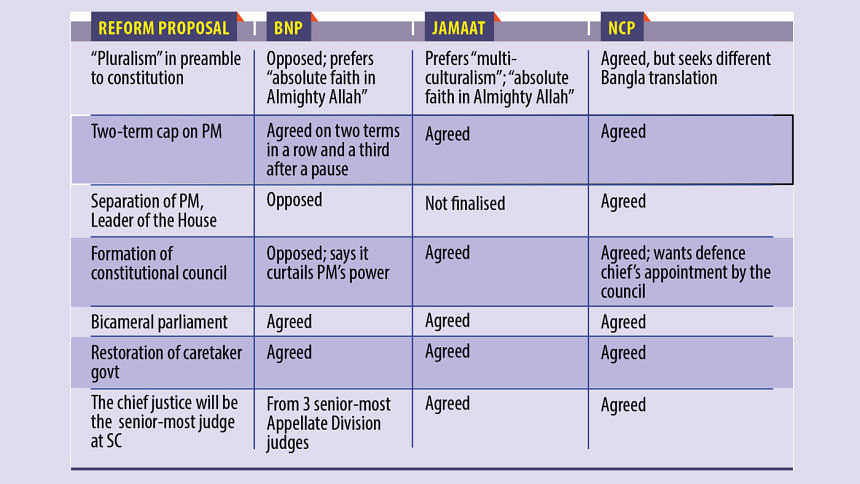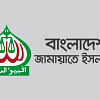Parties split over ‘pluralism’, nat’l constitutional council

The National Consensus Commission's talks with major political parties have yielded a broad consensus on key issues such as caretaker government system and a bicameral parliament, but the parties remain divided on some sensitive questions.
Through a 166-point questionnaire, the commission seeks input on changes to the constitution, electoral and anti-corruption systems, judiciary and public administration. These will lay the groundwork for a reform charter based on the spirit of the July uprising of 2024, aiming to ensure democratic stability and transparency.
The commission has sat with 23 political parties and platforms so far, with the three major players -- the BNP, Jamaat-e-Islami, and the newly formed National Citizen Party (NCP) -- responding in detail to some of the most crucial proposals.
The parties hold differing views on issues like "pluralism" in the constitution's preamble and the separation of roles between the prime minister and the Leader of the House.
The BNP has rejected the idea of "pluralism" in the preamble. Instead, it advocates the restoration of the phrase "absolute faith in Almighty Allah", aligning with the pre-2011 version of the constitution.
The Jamaat also wants the phrase "absolute faith in Almighty Allah" in the preamble. Besides, the party partially agreed with the commission on "pluralism", saying it prefers the inclusion of "multiculturalism" instead of "pluralism" to better reflect the Islamic values and cultural dynamics in Bangladesh.
The NCP also partially agreed with the commission, but said it wants the English word "pluralism" replaced with a better Bangla translation, arguing that it created confusions among some political parties.
Jamaat and NCP agreed to the proposal for a two-term cap on the prime minister's tenure. The BNP, however, proposed allowing two consecutive terms for a prime minister, with eligibility for a third term only after a break of at least one term.
The BNP and the Jamaat called for defining the PM's tenure as five years, while the NCP endorsed the proposal for a four-year tenure.
One of the other proposals suggested that the prime minister and the Leader of the House should not be the same person.
The BNP rejected this idea outright, arguing that the dual role is a long-standing tradition in Bangladesh.
The party contended that the role of the Leader of the House does not involve executive authority and hence does not conflict with the PM's responsibilities.
On the other hand, the NCP supported separating these roles, believing that such a step would foster greater checks and balances within the parliamentary framework.
The Jamaat said its position was not finalised on the issue, and the party would discuss it further with the commission.
The proposal for the formation of a National Constitutional Council (NCC) as an institutional mechanism to oversee appointments to constitutional bodies, such as the Election Commission, met with divergent views.
The BNP opposed the idea, saying it would dilute the executive powers of the prime minister and could create bureaucratic bottlenecks.
Jamaat endorsed the formation of such a council, considering it essential for depoliticising key institutions.
The NCP also agreed with the proposal and said that the selection of the defence chief and all the constitutional posts should be done by the council.
One major area of agreement among all three parties was the introduction of a bicameral parliament.
All parties endorsed the proposal, seeing the creation of an upper house as a means to introduce broader regional and professional representation and to curb the concentration of legislative power in a single chamber.
The BNP, however, disagreed with the commission's recommendation for proportional representation in the proposed upper house, insisting that any decision on a bicameral legislature must come through open debate in an elected parliament.
Similarly, the reinstatement of the caretaker government system received unanimous approval from the three parties.
They agreed that a neutral interim government is essential to ensure free and fair elections and to restore public trust in the electoral process.
On judicial reforms, the BNP proposed that the chief justice should be selected from among the three most senior judges of the Appellate Division of the Supreme Court, instead of the senior most judge, as proposed by the commission.
Additionally, the party supported the creation of a Judicial Appointment Commission, but emphasised that its structure and mandate should be discussed and finalised in parliament.
The Jamaat and the NCP agreed with the commission on these points.
However, divisions reemerged over the proposal for a separate secretariat for the judiciary, with the BNP warning that any move to introduce judicial reforms outside the constitutional framework would be unlawful.
Jamaat and the NCP both supported the idea, arguing that a separate secretariat would help enhance judicial independence and administrative efficiency.
Another contentious issue was the proposal to make the Election Commission accountable to a parliamentary standing committee if the election commissioners neglect their duties.
The proposal suggested that this could help oversee the EC's activities and ensure its neutrality.
The BNP opposed the idea, stating that such a move would reduce the EC's autonomy and potentially politicise it.
The NCP and the Jamaat supported this proposal, saying it would improve transparency and public confidence in the electoral process.
Speaking about the talks recently, National Consensus Commission's Vice-Chair Prof Ali Riaz said, "We are working… We hope to reach common grounds on the reform proposals, and we are currently negotiating with the parties."

 For all latest news, follow The Daily Star's Google News channel.
For all latest news, follow The Daily Star's Google News channel. 






Comments